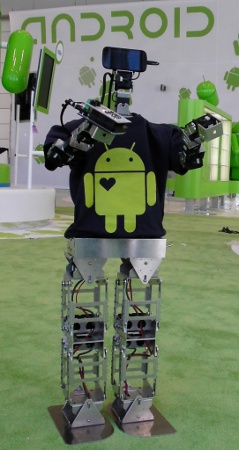Android Open Accessories gains third party support
May 16, 2011 — by Eric Brown — from the LinuxDevices Archive — 7 viewsGoogle's Android 3.1 Open Accessories initiative for connecting Arduino-based gadgets via USB has attracted third-party support. In addition to the RT-manufactured Google reference platform, Future Technology Devices International (FTDI) is preparing a compatible product using a “Vinco” development board that incorporates the Vinculum II USB controller, and Microchip is shipping a compatible PIC24F Accessory Development Starter Kit that uses its own PIC microcontroller.
The Android 3.1 update released by Google last week at Google I/O (starting with the Motorola Xoom tablet) was largely concerned with fixing the problems in Android 3.0. However, at least one major structural enhancement was provided by the release's improved USB support and by a related Arduino-based Android Open Accessories initiative.
Google has published an Android Accessory gadget control platform API and application development kit (ADK). The ADK, which has been backported to the new Android 2.3.4 for smartphones, enables any USB-connected accessory designed with the API to interact with Android devices.
Now, third parties are announcing support for the platform, including FTDI and Microchip (see farther below).
RT's RIC Android 2011 robot prototype, controlled by an Android Accessory ADK
(Click to enlarge)
A reference hardware reference platform design kit for the API is offered by Google and manufactured by RT Corp. However, it is currently listed by RT as being sold out, with "next production in the end of May." The Japanese robotics equipment manufacturer sells the kit for 31,500 Yen ($389).
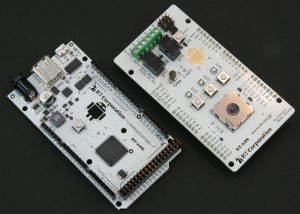
RT-ADK hardware reference platform, with Arduino-based RT-ADK (left) and RT-ADS Android interface board on right
The baseboard, called the RT-ADK (above), incorporates the Arduino Mega open source electronics prototyping platform. The Mega module is based on the Atmel Atmega1280, an 8-bit AVR microcontroller with 64K, 128K, or 256KB of programmable flash memory.
A second RT-ADS board offers the Android interface, plus sensors and input devices. These include a joystick, three buttons, and three LEDs, plus light, temperature, and touch sensors. There are also two software-operable relays, and three connectors for servo motors, says RT.

Google's bowling ball labyrinth, controlled by a Motorola Xoom running Android 3.1 and the Open Accessory ADK
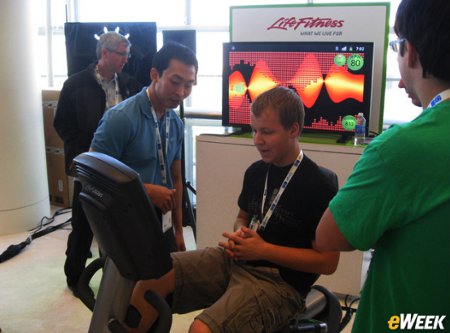
LifeFitness exercise bike with Open Accessory integration
FTDI's Vinco board
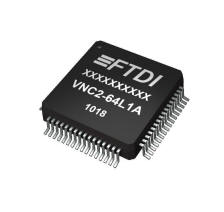 Future Technology Devices International (FTDI), known for its USB technology, has announced its intention to support the Android Open Accessories initiative with its Vinculum II dual USB host/device controller IC, as well as its "Arduino-inspired" Vinco development board. The Vinco board, which integrates the Vinculum II chip (pictured at right) is said to be a superset of the Arduino Duemilanove/Uno, adding two extra rows of headers comprising 10 new pins.
Future Technology Devices International (FTDI), known for its USB technology, has announced its intention to support the Android Open Accessories initiative with its Vinculum II dual USB host/device controller IC, as well as its "Arduino-inspired" Vinco development board. The Vinco board, which integrates the Vinculum II chip (pictured at right) is said to be a superset of the Arduino Duemilanove/Uno, adding two extra rows of headers comprising 10 new pins.
The Vinco board offers an advantage over working directly with an Arduino module because the host controller capability is already integrated into the board, says FTDI. This means engineers do not need to integrate an extra USB host controller card or IC to implement Android Open Accessories, thereby "dramatically shortening the development process and reducing the bill of materials," says the company.
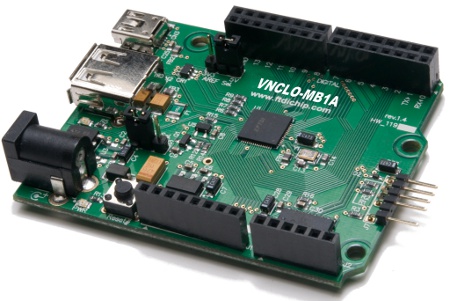
FTDI's Vinco board
(Click to enlarge)
Microchips ships starter kit
Microchip announced two Accessory Development Starter Kits for Android, which consist of a development board and a freely downloadable software library to "enable the fast and easy development of Android smartphone and tablet accessories," according to the company. The kit is compatible with the Android Open Accessory API and supports Android 2.3.4 and 3.1, says the company.
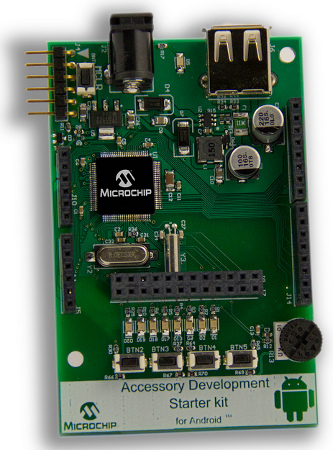
PIC24F Accessory Development Starter Kit
(Click to enlarge)
In the third quarter, the company plans to ship a PIC32 version of the kit, available for the same $80 price as the 16-bit version. The PIC32 would appear to be based on the 32-bit PIC microcontroller, which features an 80MHz MIPS M4K core, up to 128KB SRAM and 512KB flash memory, and support for Ethernet, CAN, and I2C, among other interfaces.
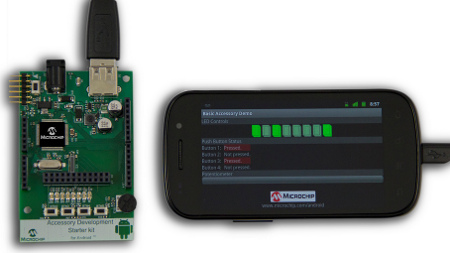
PIC24F starter kit board (left) with Android display unit
(Click to enlarge)
In addition, the board supplies "standard Arduino connectors," says Microchip. The latter are said to support connections to a variety of third-party "Shield" expansion daughter cards available for the growing number of open platform Arduino modules.
The kit ships with schematics and gerber files, as well as a free software library that includes a sample application protocol and an abstraction layer, says Microchip. Sample accessory applications are said to include:
- automotive (car kits, audio, GPS)
- home devices (audio docks, remote controls, data backup),
- fitness/health (glucose meters, fitness equipment)
- business (credit-card terminals, projectors)
This article was originally published on LinuxDevices.com and has been donated to the open source community by QuinStreet Inc. Please visit LinuxToday.com for up-to-date news and articles about Linux and open source.
